Over the course of February, we again ran the Foreman Community Survey to get feedback on how we’re doing and what needs to be addressed. I’ve now had some time to sit down and look through the data, and share some insights with you all.
Firstly - thank you to all those who filled out the survey. It was a little bit longer this year, as we looked to get data on how we can grow the contributor community as well as the user community, so thanks for taking the time. It’s great to hear all your feedback.
Contents
- Intro
- Community Diversity
- Support and Docs
- Specific Features
- Upcoming Work
- Events
- Contributor Survey
- Final thoughts
Sadly, response were slightly down from last year (76 responses) and the smaller sample size makes it difficult to draw strong conclusions. According to other metrics, we have usually 250ish active people in IRC each month, and some 2000 people on the mailing list. Suggestions on how to reach more people with the survey are, of course, welcome!
That said, we can still look at the results and look for trends, especially as compared to last year (which we couldn’t do then, it being the first such survey). Lets start with some stats on…
Community Diversity
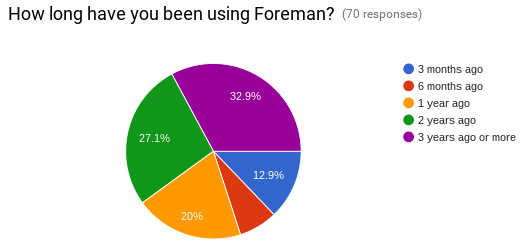
This is broadly similar to last year, with some 40% of the community having used Foreman for under a year. We do see a shift in the 3+ years category, with a corresponding drop in 1 and 2 year categories, but it’s nice to see that the 3 months category remains stable at 13% - we seem to be continuing to attract new people to the community, which is great. Having more “old hands” around to answer questions is starting to be noticable on IRC and the mailing lists, too.
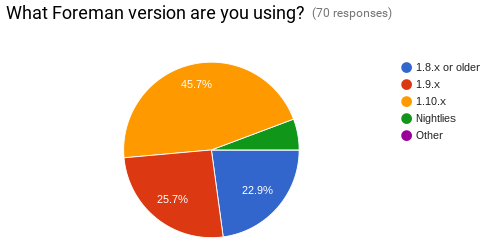
I was quite surprised by this - Foreman 1.10 was released at Christmas, meaning it had only been out for 4 weeks by the time of the survey. It’s great to see people so quick to upgrade something which can be so deeply embedded in the infrastructure. When you add in 1.9 (we still support the last two versions, so this is the total supported userbase) we get 71% which is a bit of a drop on last year (86%). A quarter of responses are running an unsupported version of Foreman - as we said last year, if there’s anything holding you back from upgrading, do get in touch!
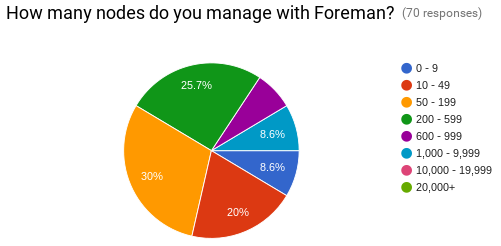
Again similar to last year, we see under 10% of responses coming from large installations (>1k nodes). It is good to see a spread here though, as it shows we’re meeting the needs of a wide variety of infrastructure usecases and network topologies.
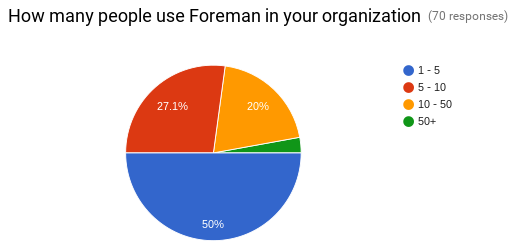
Interestingly, larger numbers of users (>10) shows growth this year, up to nearly 25%. Hopefully this is due to continuing effort in our Roles, Authorization, and Locations/Organisations features. That said, a solid 50% remain in the 1-5 section, so keeping the option to disable or streamline these features is also important. This is relevant due to the discussion around Locations/Organisations at the moment.
Finally for diversity, lets have a couple of bar charts:
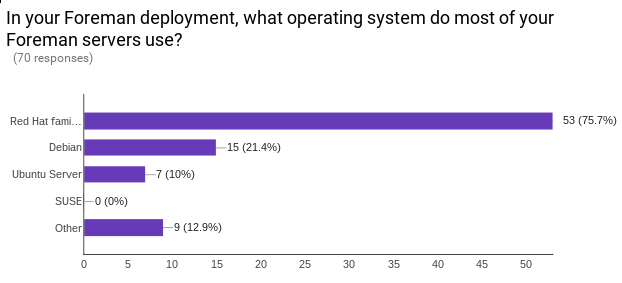
This year we allowed respondents to select more than one option, as “most” is subjective, especially when you put proxies and Foreman itself in the same question.
Keeping this in mind, we see that Red Hat family distros remain constant at 75%, but there’s a marked increase in deb-based distros (up 5%) and in “Other” which is up 10%. It would be very interesting to hear from those users about what OSs they are using!
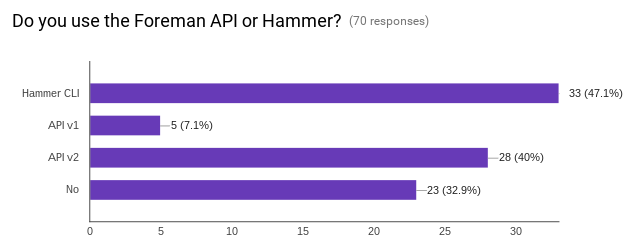
Hammer remains stable this year at just under 50%, and it’s good to see APIv1 declining. The real surprise here, however, is the “No” response jumping from just 6% to 32%. I have no data to suggest why this might be, but one conclusion is that the tooling we’re providing to the newer users joining the community is now sufficient for their needs. If you’ve got a story about this, let us know!
Overall, the community seems diverse in many respects, with different sizes, ages, OSs and usecases. This is good news as we move forward, since it shows we have broad appeal to people just discovering Foreman today.
Support and Docs
Moving on then, we have a number of question related to how well we meet support needs of the community:
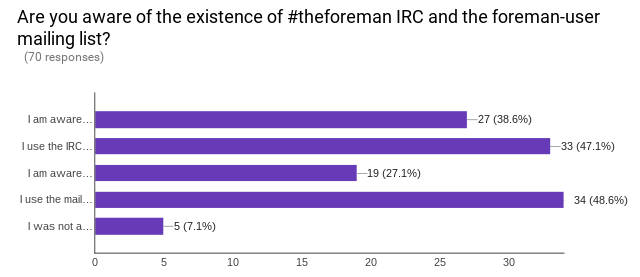
It’s not very visible (thanks Google), but the vertical axis is, in order:
- I know of the IRC channel, but don’t use it
- I use the IRC channel
- I know of the mailing list, but don’t use it
- I use the mailing list
- I wasn’t aware of either
The really important number for me here is the last one - 7% not aware of our primary support systems. That’s both good (it’s only 7%) and bad (how do we reach those people). For the others, so long as they know that the IRC channel and mailing lists exist, that’s good - they can get help when they need it.
To those who said they spend active time on the lists and on IRC - thank you! User-to-user support is one of the things that makes community leads go all warm and fuzzy and liable to buy rounds ;)
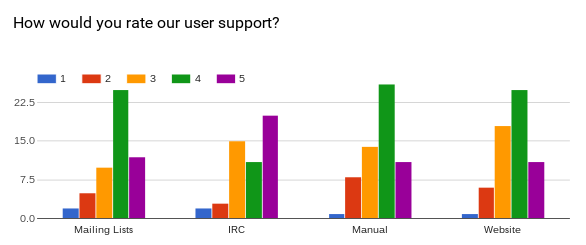
We have a great reputation for our IRC channel, and that’s reflected here in the 5-star rating our IRC support gets in the survey results. Happily the other support routes also do well, getting 4s across the board. This is great to see, but there’s always more we can do, as seen below in the free-text comments.
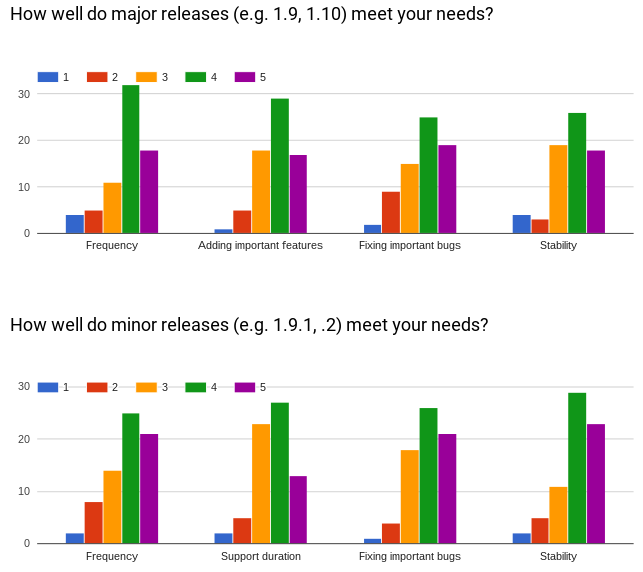
I was worried about this one - if, say, frequency had come out as bad, we’d have no data on whether it was too fast or too slow, etc.
Thankfully, we seem to do pretty well across the board, with the majority being 3+ in every category, which is all the more important since it’s largely the same as last year, showing that we have consistency in our releases as well as providing what our users want. Whilst a lot of people work on each release, I think it’s worth calling out Dominic Cleal for all he does around release engineering - thanks!
The final support question was a free text field, and I don’t plan to cut’n’paste the entire result set, but we did get some themes. Out of the 17 responses to this question:
- 11 were generally positive about the support/docs (65%)
- 7 requested more diagrams or how-to guides (potentially including screencasts) (41%)
- 3 specifically requested improvements to plugin docs (18%)
It’s good to see two-thirds of the responses are positive, as a lot of effort goes into the manual and support channels. I still plan to produce my “beginners guide” screencast series “soon(tm)”. Plugins, as ever, remain the responsibility of the authors, but the development community tries to help out where we can. Writing docs is also a great way to get started with contributing, if you’re so inclined!
Specific Foreman Features
Now we move onto the detail in some of Foreman’s features:
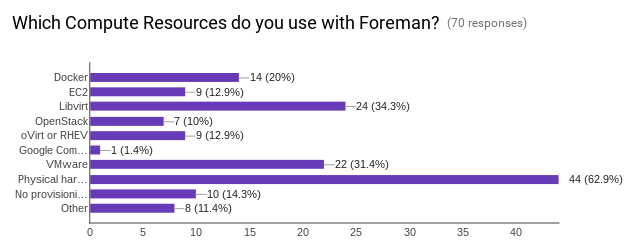
This graph is fascinating for quite a few reasons. Firstly, in a change from last year, we explicitly included “Physical hardware” as an option - although the question is about Compute Resources, in reality it should have been “What do you provision on with Foreman?”. By including this separately from “None”, we get that nearly two-thirds of the community still manage physical hardware with Foreman. PXE is not dead yet, it seems!
The other interesting figures are in the shifts from last year. EC2 and OpenStack both lose a few percentage points (most likely due to the lack of support for newer advanced networking & storage features), while VMware and Docker (no surprise there) gain a few. The really big increases, though, are in Libvirt and oVirt, which given the Docker hype this year is really surprising to me. Other is also up substantially, perhaps in a nod to our plugin structure for Compute Resources.
Overall, this graph nicely highlights the diversity of infrastructure that we’re able to support, and cautions us about getting to narrow-minded with respect to a particular platform. We do well because of our neutrality.
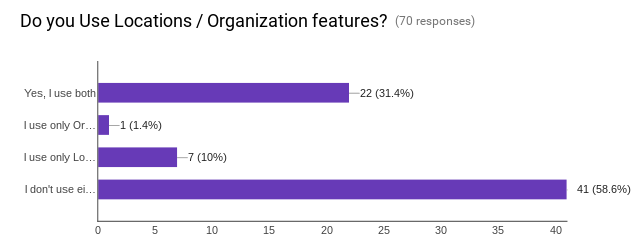
One of our more advanced features, Locations / Organisations are a scoping mechanism, useful if you have resources that should only matter to certains places or people (e.g. multi-tenant setups). Whats interesting here is that while the number of users not using Locs/Orgs is constant, many of those who used just one last year now use both (24% -> 33%).
We actually asked three questions on this feature, as the developer community wanted to gather usecases for a potential refactoring of the feature, and wanted to be sure we didn’t break it for anyone. We’ll be able to say more on this once the refactoring is decided on (or not)
This next graph is huge. Sorry ;)
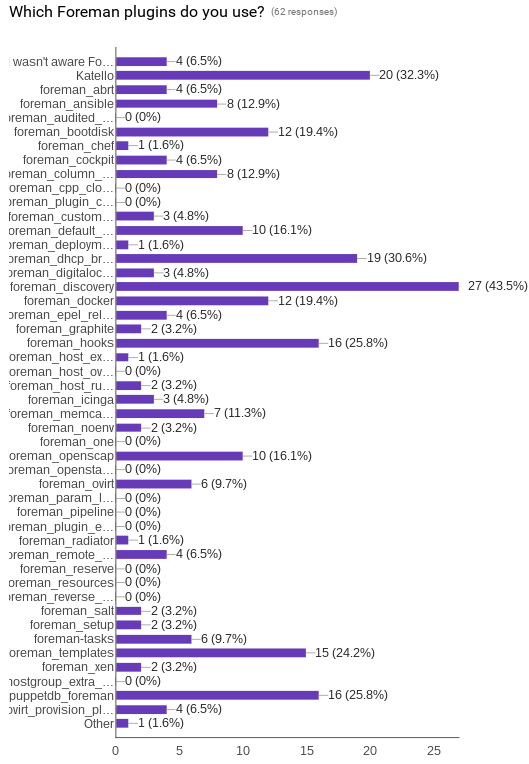
Most of the big usage numbers here are entirely expected. Discovery tops the chart again, but it’s good to see Katello move in to second place; closely following are foreman_hooks, puppetdb_foreman, foreman_templates and foreman_bootdisk. I’ll admit I was surprised to see foreman_dhcp_browser up at 30% - perhaps this indicates a need for more Smart Proxy visibility from within the UI? Happily, such things are in progress and you’ll be able to see a lot of it in 1.11. The Release Candidates are out now if you just can’t wait!
The fast movers are foreman_ansible, and foreman_openscap, both developed this year - in particular the Ansible plugin is only a few months old, so it’s 13% uptake is rapid indeed.
As with last year, this shows some of the activity in our plugin ecosystem, which is great to see. We really want to see plugins succeed, and provide a lot of materials to help get started writing them, so graph like these are a reward for that effort.
Upcoming work
For this, we changed the style this year. Rather than ask for interest ratings on individual features from 1-5 (which can be a problem since not every feature is of interest to all users), we decided to simply ask for your top 3 wishes, in no specific order. This list was drawn from the items still not done from last year, from some things that come up over and over in conversations, and so on.
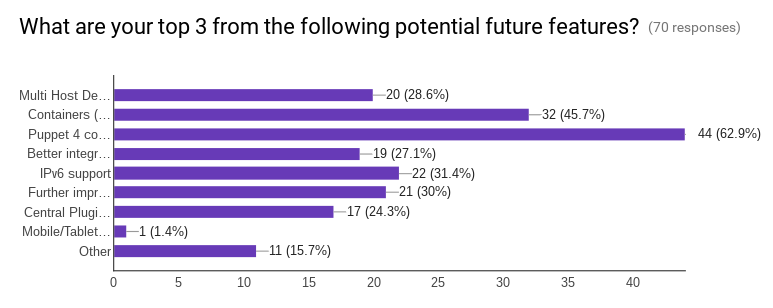
Overwhelmingly, Puppet 4 support tops the bill. We knew this would be high on the list, so we took time to meet with Puppetlabs at CfgMgmt Camp, and come up with a plan of action (you can read it here). This work is tentatively scheduled for 1.12, but as ever with open source, there’s no promises.
Following that, we see better container support coming in strong. We’ve already got a Docker plugin, Docker registry support via Pulp/Katello, and CoreOS & Atomic provisioning support. Do file feature requests on this area if you have specific features relating to containers you’d like to see.
All the others come in roughly equally, with a very slight edge to networking and IPv6. The developer community will be taking this on board in the coming year, and I really hope that next year (as with this year) we can say that we’ve delivered on a lot of these items.
We also had a free-text field for people to put their #1 wish in. Again, Puppet 4 comes out strongly here, but also more Ansible integration, VMware, IPv6 and Katello development were common.
Events
We split this up this year. Last year we only asked if you would like to attend events - this time we also asked if you’d be willing to help organise them:
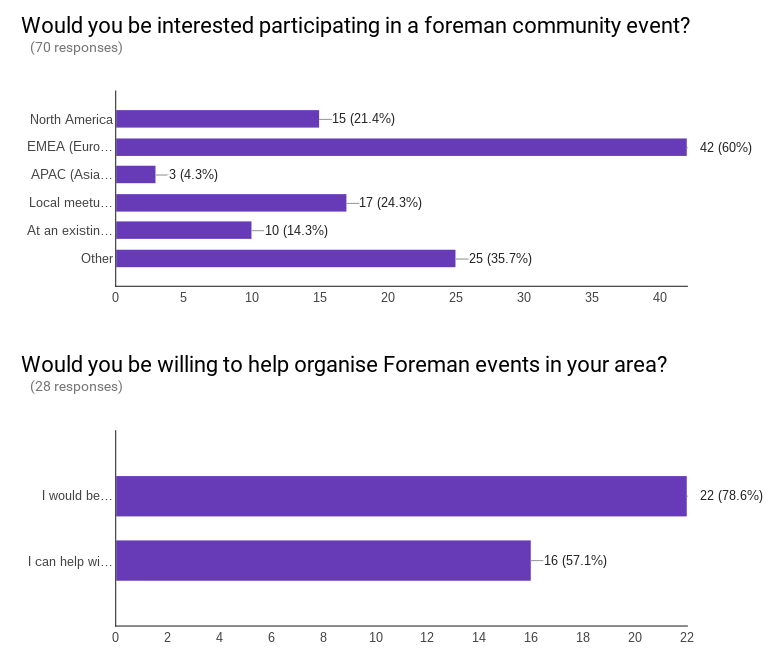
We see that the US and EMEA are popular, but a sizeable chunk of people would like a local meetup. We’re investigating getting involved with other local events such as DevOpsDays and so forth - if there’s an event near you that you think we should be at, let us know!
I’m really excited that 22 peaople said they’d be willing to speak about Foreman at conferences, and 16 people would be willing to help set up events - thanks! However, this is an anonymous survey! Please, please email me with me about this - I’m starting to build a collection of potential speakers (and their areas of travel), and potential event locations to see what we can match up.
Again, if you responded to this question - please email me! Thanks!
Contributor survey
I’ll keep this section brief, but here’s two interesting graphs:
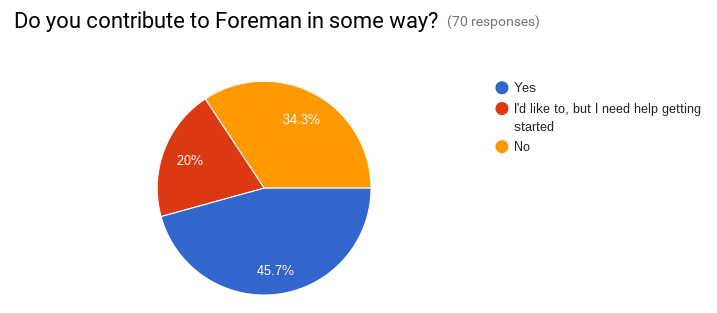
Clearly, the responses to this question will be strongly skewed in the contributor survey. However, I think it’s notable that 20% of people felt strongly enough to fill this out even though they are not currently a contributor - it implies there’s probably more people in this position. We owe it to ourselves to support new contributors and help them get started.
I do have some ideas here, such as more screencasts (how about a “Let’s Play” of writing a plugin?) and also perhaps a “where can I help” workflow on the website, similar to the Mozilla site.

Leading on from that, it seems that while we are consistently good at helping out once we get to reporting and monitoring PRs, the picture for helping those who are stuck (either stuck in some code, or stuck just getting started) is a bit more mixed. Work is underway to write a developer handbook which is helping to clarify this, and further work remains to be done on it. This should probably re-emphasize the IRC dev channel as the primary means of support when contributing.
Final thoughts
It’s fascinating reading through all the comments and stats - there’s more data in here than I can show without this becoming a book, but I’ll be using it myself in my role to assist the community further.
Hopefully the above gives you a flavour of where we’re at. For myself, I feel that we get good marks for our support, and we do a good job of handling releases, new features, etc as well. Well done to everyone who participates in making this one of the best communities I’ve ever been in!
I’ll leave you with a few of my favourite quotes from the question “Do you have any additional comments or special requests?”:
- Thank you for a great solution!!! Keep up the great work!
- When I adopted Foreman I mostly wanted a good DHCP/PXE provisioner with a solid, simple classifyer. You’ve come to meet and exceed my needs
- Thank you! You guys are making my team spend much less time configuring servers and instead they can do productive stuff
- Thanks for the t-shirt at FOSDEM!
I freely admit cherry-picking these - but the other comments are just as valuable! All the feedback will be noted down for future use.
Thanks once again to everyone who filled out the survey!